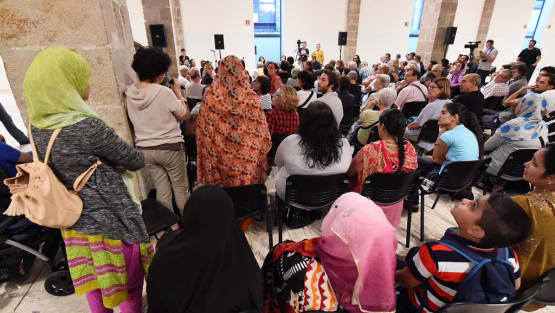Tasked with a clear transformational and feminist purpose, Barcelona City Council aims to launch a series of initiatives, programmes and proposals to help to socialise the responsibility of care work by recognising its social value and ensuring the right to provide and receive care in decent, quality conditions.
We understand that making public policies to democratise care work requires intervening in the diversity of problems we detect in the provision of care, which is why we have defined the following strategic areas of action:
- To recognise care work as a central part of the city's socioeconomic life.
- To promote the various social stakeholders’ shared responsibility for ensuring the right to receive and provide decent, quality care.
- To reduce the social inequalities that typify providing and receiving care.
- To promote the empowerment of the people who receive or provide care.
A new approach to care work
The social profile of care work has risen in recent years. Along with the outbreak of the global financial crisis in 2008, the feminist movement also began to talk about a ‘care work crisis’, laying bare the inability of the economic and social system to guarantee the well-being of the population’s broadest sectors. Numerous voices have proposed a radical transformation of the model for the social organisation of care work, to make care work a priority responsibility for all city residents, which can be assumed and discharged by various social stakeholders in physical spaces and through social links that go beyond family ties. It is from within this context that the paradigm for democratising gender care and justice championed by authors such as Nancy Fraser, Amaia Pérez Orozco, Cristina Carrasco and other feminist economists and activists emerges.
Over the last 40 years the feminist movement has designed and promoted various strategies for intervening in the social organisation of care work. While egalitarian policies such as the opening of public facilities for child care and moves designed to help balance family life with work have helped enormously with promoting employment for women, they have not changed the disadvantageous conditions under which women are incorporated into the labour market, nor have they promoted the incorporation of men into social-reproduction work. And while the aim behind measures such as financial benefits linked to maternity leave and the famous Dependency Act have been to provide financial support for the care work carried out informally by families, they have failed to transform the collective imaginary where care work is still perceived as an inherently female condition.
Today we aim to give new impetus to the efforts to change the collective perception of care work as a women’s occupation and to distribute the responsibility for care work more evenly. Hence our proposal for a feminist policy that works from the perspective of democratisation and gender justice.
Care work is everyone’s responsibility
Care work is everyone’s responsibility
A new municipal policy designed to involve all social stakeholders in the provision of care in the city.

Let's recognise its social value
Let's recognise its social value
We aim to recognise and raise the profile of care work as a central element in the social and economic life of the city, while also reversing the social inequalities generated by the current organisational model.

Let's reduce inequalities
Let's reduce inequalities
We need to challenge stereotypes and perceptions of gender and social class that have caused women and people with immigrant backgrounds to be the main providers of care work.

Let's help to empower people
Let's help to empower people
We are opening up meeting and exchange spaces where people receiving or providing care can express their wishes and requirements, share their needs and organise themselves to enforce their rights.




